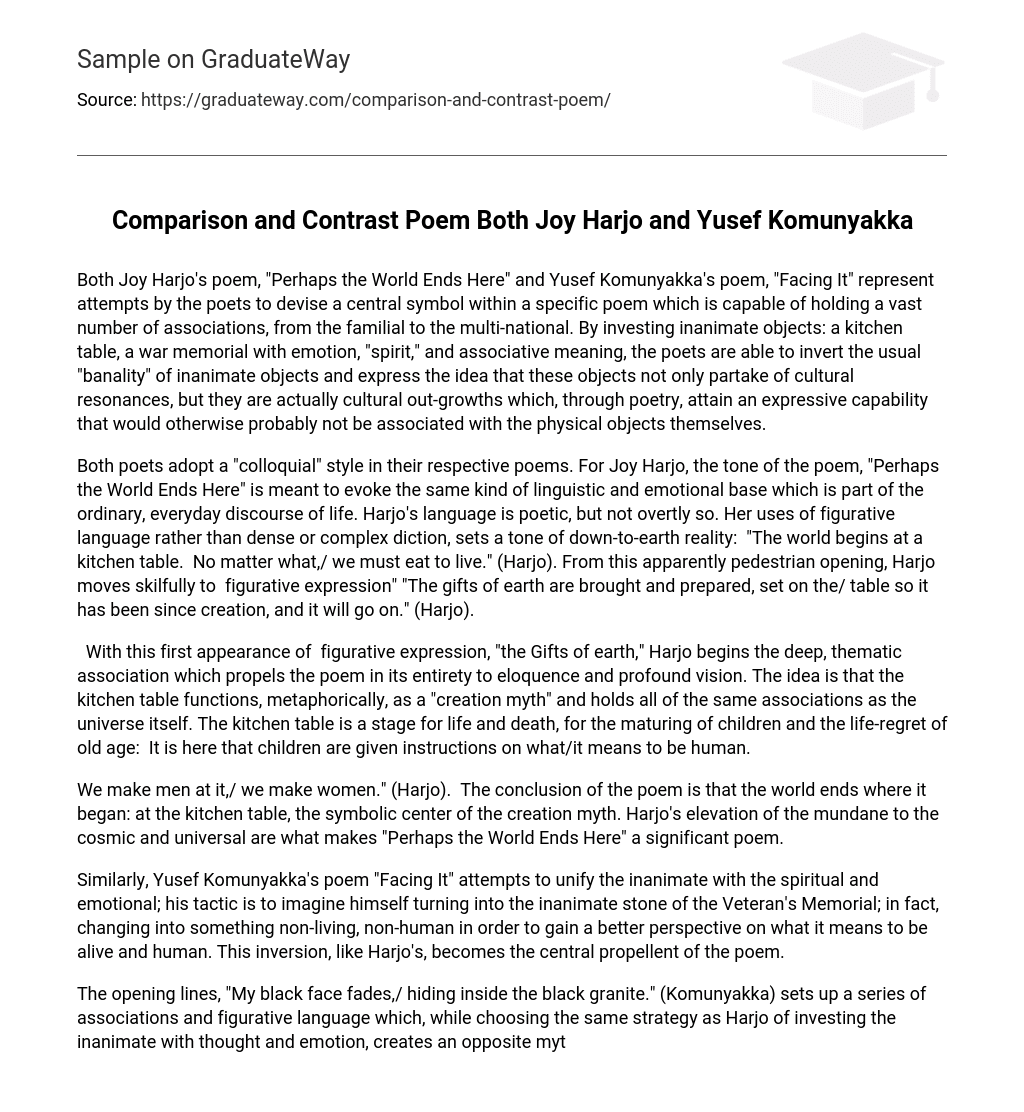Both Joy Harjo’s poem Perhaps the World Ends Here” and Yusef Komunyakka’s poem “Facing It” represent attempts by the poets to create a central symbol within a specific poem that can hold a vast number of associations, from the familial to the multinational. By imbuing inanimate objects such as a kitchen table or war memorial with emotion, spirit, and associative meaning, these poets are able to invert the usual banality of such objects. They express the idea that these objects not only partake in cultural resonances but also become cultural outgrowths which attain an expressive capability through poetry that would otherwise not be associated with their physical form.
Both poets adopt a colloquial” style in their respective poems. In “Perhaps the World Ends Here,” Joy Harjo aims to evoke the same kind of linguistic and emotional base that is part of ordinary, everyday discourse. Her language is poetic but not overly complex. Instead, she uses figurative language to set a tone of down-to-earth reality: “The world begins at a kitchen table. No matter what, we must eat to live.” From this seemingly mundane opening, Harjo skillfully moves to figurative expression: “The gifts of earth are brought and prepared, set on the table so it has been since creation, and it will go on.”
With this first appearance of figurative expression, the Gifts of earth,” Harjo begins a deep thematic association that propels the poem to eloquence and profound vision. The idea is that the kitchen table functions metaphorically as a “creation myth” and holds all the same associations as the universe itself. The kitchen table is a stage for life and death, for children maturing, and for the regrets of old age. It is here that children learn what it means to be human.
We make men at it, we make women” (Harjo). The conclusion of the poem is that the world ends where it began: at the kitchen table, which is the symbolic center of the creation myth. Harjo’s elevation of the mundane to cosmic and universal levels is what makes “Perhaps the World Ends Here” a significant poem.
Similarly, Yusef Komunyakka’s poem “Facing It” attempts to unify the inanimate with the spiritual and emotional. His tactic is to imagine himself turning into the inanimate stone of the Veteran’s Memorial. He changes into something non-living and non-human in order to gain a better perspective on what it means to be alive and human. This inversion, like Harjo’s, becomes the central propellant of the poem.
The opening lines of Komunyakka’s Facing It,” which read “My black face fades, hiding inside the black granite,” set up a series of associations and figurative language. While Harjo also invests inanimate objects with thought and emotion, Komunyakka’s poem creates an opposite mythic arc. Harjo’s poem is a creation myth expressed through mundane or banal imagery and symbolism, whereas “Facing It” is a myth of death.
The opening lines of the poem should be interpreted as the symbolic death of the poem’s speaker. The rest of the poem describes the poet’s experience of death, as it is revealed to him through the monument.
I turn this way and the stone releases me. I turn that way and I am once again inside the Vietnam Veterans Memorial, where the light can alter everything. (Komunyakaa)
It is worth noting that Harjo’s creation myth ends with the death of the world, while Komunyakka’s death myth ends with an image of rebirth: In the black mirror, a woman is trying to erase names. No, she’s brushing a boy’s hair.” (Komunyakaa) Both poets allowed the inanimate world to gain expression through poetry. However, Harjo discovered an essentially nihilistic “root” to her figurative associations, whereas Komunyakka discovered endless rebirth in the associations of the war memorial. Both poets favored straightforward emotional response and philosophical insight over dense or richly constructed verse.





